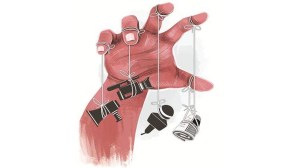Write Back
Don't knock these Vittal proposalsI am a little amused by Shekhar Gupta's piece, Icondemnyou.com' January 29 where after taking a few p...

Don8217;t knock these Vittal proposals
I am a little amused by Shekhar Gupta8217;s piece, Icondemnyou.com8217; January 29 where after taking a few potshots at N. Vittal, he comes up with a facile solution to the most intractable problem of corruption. To wit: 8220;We overlook the basic issues: corruption grows from a system of political and bureaucratic discretion where the state controls too much of our lives, our businesses, our work-places and almost anything that determines our quality of life. The answer to corruption in the government, therefore, is less government8230;8221; Alas, the answer is not that simple. The suggestions smack of lucid theorising by a well-intentioned outsider to bureaucratic functioning.
But how 8220;less8221; can government and, by extension, bureaucracy be? Can we do away with subjects of defence, law and order, revenue administration, health, education, even forest and environment, not to speak of the whole gamut of development administration? Yes, government can be reduced throughliberalisation and the dismantling of the licence-permit quota raj. But even to achieve this, the government has to play the role of facilitator.
Gupta has raised the vital issue of the need to change the bureaucrat8217;s body chemistry but here, I am afraid, he is enormously more charitable to bureaucrats then they deserve. Let8217;s be honest. Very few join the civil service to serve the ordinary person. They join it to make a decent living, and enjoy a high standing in society.
It is true that corruption in the bureaucracy reflects the malaise of society at large, which we must certainly work towards eliminating. But there is every reason to argue that the cleansing process should begin with the bureaucracy. Are the politicians alone responsible for breaking the back of the bureaucrats in UP and Bihar? It takes two to tango and the former could surely not have achieved much without the active connivance and servility of the latter. One knows of so many upright bureaucrats from these states. They aremarginalised, if not hounded, by their own brethren, working in tandem with their political masters.
There is thus no getting away from the fact that the babu has to be fettered and not just by the traditional, time-tested manner prescribed in the Classification, Control and Appeals handbook. The departmental codes and manuals coupled with the Indian judicial system have given the corrupt a sense of implacable immunity against being penalised. That is what has prompted Vittal to seek out novel ways to expose the dishonest.
Ultimately, the only potent approach to contain and, over time, eliminate corruption is to empower people by giving them the right to information. Achieving this will not, of course, be an easy task. The scams and scandals over the years have shown in unmistakable light the harm caused in a system that apotheosised secrecy. We need to be reminded that even the noblest suggestions of the Santhanam Committee were whittled down to soft-pedal moves to catch the corrupt.
The most importantprop for a responsive and honest administration is openness that can be achieved only by a complete overhaul of the existing rules which deny the public access to official information. After all, it is the public which ought to be the final arbiter of governmental functioning.Well-argued responses to Express8217; articles and reports, carried in this column, will be paid for. Contributions must be no longer than 600 words.
- 01
- 02
- 03
- 04
- 05































